Physical Address
304 North Cardinal St.
Dorchester Center, MA 02124
Physical Address
304 North Cardinal St.
Dorchester Center, MA 02124
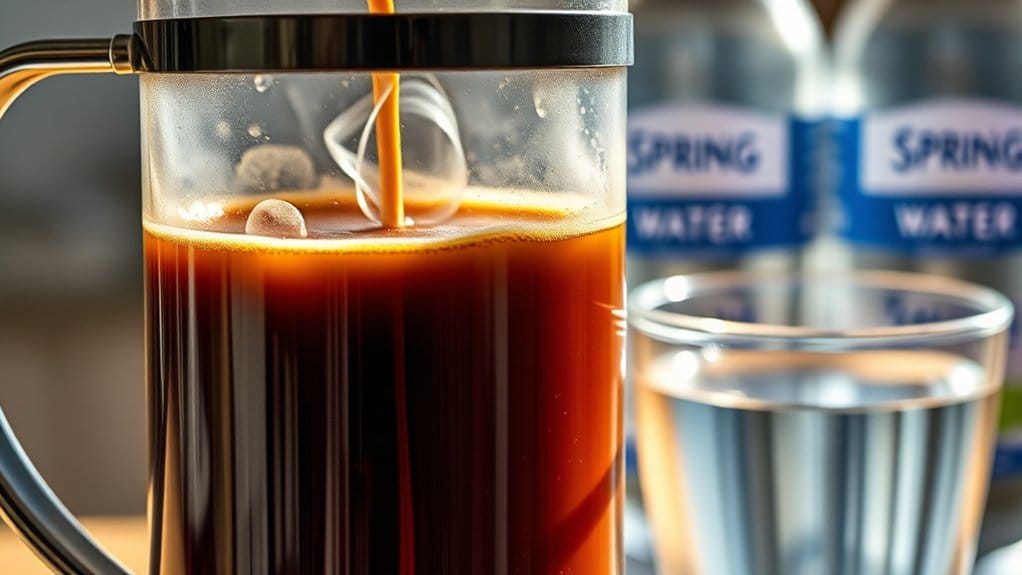
Using distilled water for your coffee really lets the true flavors shine bright! Unlike spring water, which can pack unwanted minerals, distilled water gives you a clean slate. That means no bitter or sour notes from high mineral content, just delicious, pure coffee goodness. Imagine sipping a well-balanced cup that highlights the rich notes of your beans. Curious about how other aspects of your water choice affect your brew? Stick around to uncover more!
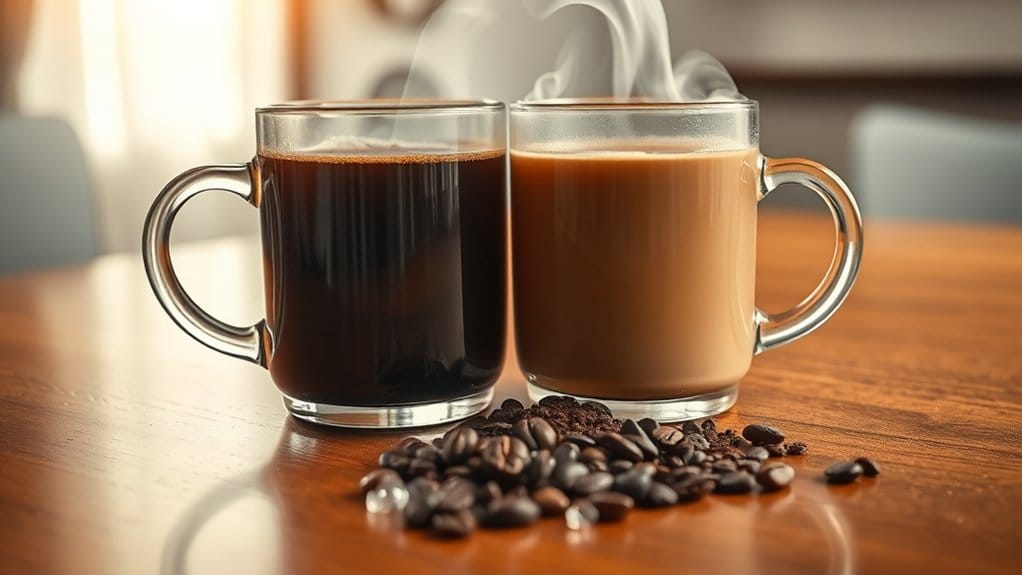
When you think about brewing coffee, it’s easy to focus on the beans or the fancy gear, but have you ever considered the water?
The right minerals make a world of difference. Calcium brings out the coffee’s bright flavors whereas giving it a fuller body. Conversely, magnesium improves sweetness and adds fruity notes, creating a delightful balance. However, understanding water mineralization is crucial for brewing quality coffee! Too much calcium or magnesium can make your cup taste chalky or bitter. The magic happens when minerals work together. Balancing ions like sodium and chloride can significantly enhance the overall sweetness and complexity of your coffee.
Just like a well-orchestrated orchestra, balanced minerals create a harmonious flavor profile.
So, next time you brew, keep in mind that the water’s mineral content plays a starring role, turning a simple cup into a flavorful experience.
Who knew water could be so interesting?
You mightn’t think about it, but Total Dissolved Solids, or TDS, can make a big difference in your coffee experience.
TDS measures how many soluble compounds you’re actually sipping in that cup of joe. You might be surprised to learn that averages run between 1.2% and 1.5% TDS for a great brew. TDS represents the concentration of soluble compounds extracted from coffee grounds, influencing flavor and texture. Additionally, the ideal TDS range for brewing coffee is between 75-250 ppm, which significantly impacts the final taste profile.
Drip coffee usually has higher TDS than percolators, making it stronger and more flavorful.
If you find your coffee tastes weak and sour, you might be dealing with low TDS from under-extraction. Conversely, a bitter cup may hint at over-extraction because of high TDS.
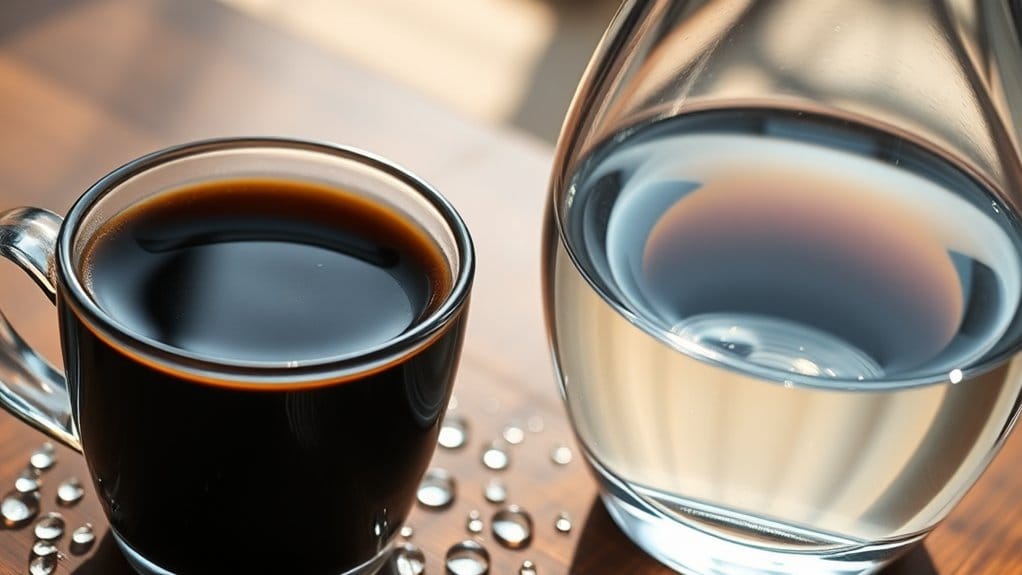
Even though it might seem surprising, the quality of water you use to brew coffee can truly transform your morning cup.
Think of water as the unsung hero in coffee making. If you use soft water with low minerals, your brew might taste sour or flat. On the flip side, hard water can crank up bitterness level and make your coffee feel like a rough ride! Ideally, you want water that’s just right, mostly neutral, allowing all those delicious flavors to shine. Plus, chlorine and other impurities? They can mess with the taste, leaving you with a muddled coffee experience. The ideal water temperature for brewing is crucial to achieving the perfect extraction and flavor.
Want that perfect brew? Choose distilled water. It’s like hitting the refresh button on your coffee game!
Maintaining your espresso machine is like giving a car a tune-up; it guarantees your coffee stays smooth and delightful.
Regular cleanings—like purging the group head after each shot—can save you from taste mistakes. Ever had a coffee that just didn’t hit right? That’s often a sign of some leftover grounds.
Each week, soak your portafilter baskets and steam wand tips in a warm detergent solution.
Don’t forget to wipe down these parts too! Think of it as keeping your kitchen tidy.
Using filtered or distilled water reduces scale buildup, boosting longevity, especially when using the Aroma G3 grinder for optimal extraction.
Don’t skip those grinder cleans either; stale oils can ruin your morning cup.
With a little TLC, your machine can serve fantastic coffee for years.
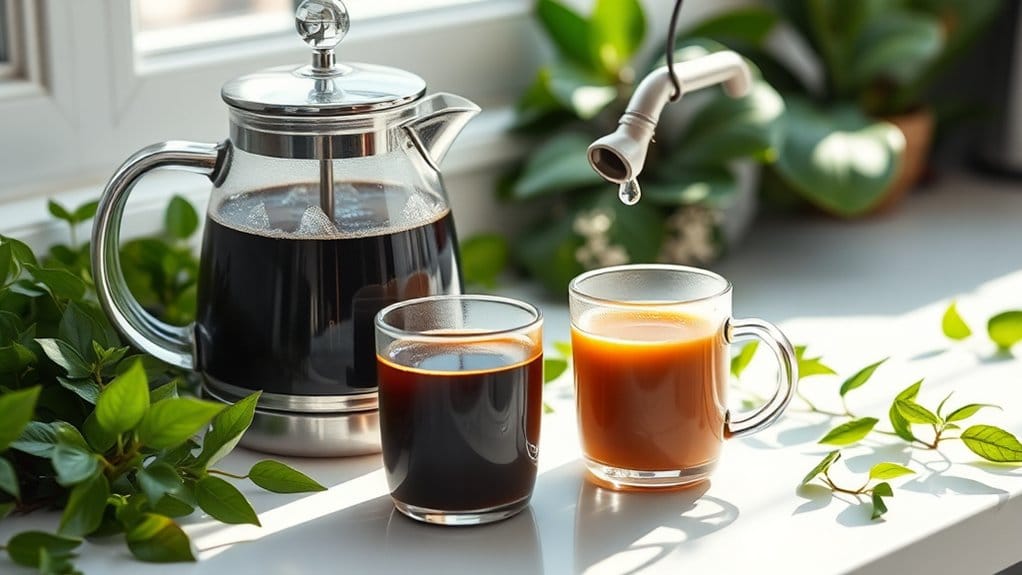
Taking care of your espresso machine keeps your coffee smooth, but have you ever thought about the water you’re using?
The choice of water isn’t just about taste; it’s an environmental matter too.
Remember, coffee needs about 140 liters of water per cup, from farming to processing. In dry regions, this can drain local water supplies.
Plus, mishandled wastewater from coffee processing can contaminate water bodies, creating health risks.
You mightn’t think of coffee as an environmental villain, but it can be!
When you choose distilled water, you’re helping reduce some of these impacts. It’s like giving a big hug to our planet during your cuppa.
When you sip your morning coffee, have you ever stopped to think about what makes it taste just right? It turns out, water plays a huge role!
About 77% of coffee drinkers add milk or cream, with many choosing almond or oat milk. That’s where distilled water shines. It creates a clean canvas for flavors. With distilled water, you might notice that bright sweetness or rich smoothness stand out more.
Interestingly, 18% prefer their coffee black—mostly guys, as women lean towards flavored beverages. This shift shows an appetite for tasty twists!
The truth is, the water you use can either improve or mute those delightful notes, making every cup an adventure for your taste buds. Additionally, using water with balanced mineral content can further enhance the extraction process, leading to an even richer flavor profile.
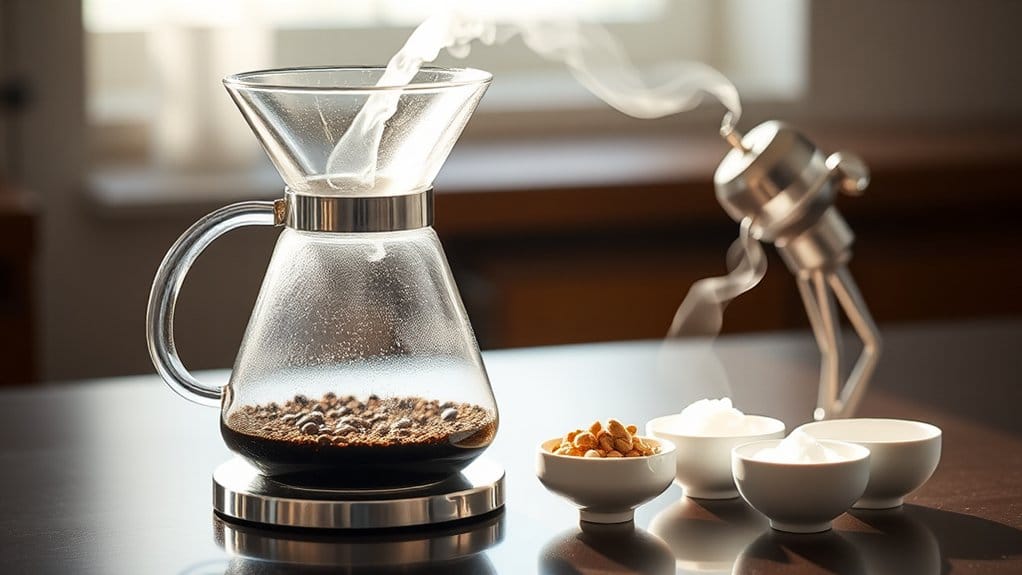
Did you know that adding just the right minerals to your water can transform your coffee experience? By incorporating elements like calcium and magnesium, you improve flavor extraction, making your brew taste richer and fuller.
Calcium boosts acidity and brightness, but too much can lead to a chalky taste—yikes!
Magnesium, conversely, highlights sweet and fruity notes, especially in lighter roasts. Sodium and chloride ions sweeten your coffee, balancing bitterness beautifully. It’s like giving your cup a warm hug!
Experimenting with these minerals lets you customize your coffee, tailoring it to your taste buds. Think of it as creating your own signature blend—where each sip surprises you with delightful nuances. Additionally, understanding the right coffee grind size can enhance extraction further.
Your perfect cup is just a sprinkle away!
You can use tap water, but it’s usually not ideal. It often contains impurities that can alter coffee flavor. Consider filtering it to balance minerals, optimizing extraction, and enhancing your coffee experience for the better.
Water’s pH impacts your coffee brewing by affecting acidity and extraction. A neutral pH around 7 balances flavors, whereas too acidic or alkaline water can result in sour or bitter coffee, altering your brewing experience.
You might consider Empirical Water, designed particularly for coffee brewing. Its unique profiles improve flavor, offering more sweetness and depth than standard distilled options. Avoid typical distilled waters, as they lack the complexity your coffee deserves.
You should change the water in your coffee maker regularly, ideally daily or whenever the tank is low. This helps prevent bacterial growth and maintains the coffee’s flavor, ensuring a fresh cup every time you brew.
Drinking coffee made with distilled water’s typically safe, but the lack of minerals might affect flavor enjoyment. It won’t directly impact your health, but it could influence your overall experience and satisfaction with the beverage.